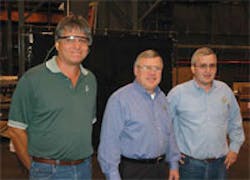Upco Inc.
Claremore, Okla.
www.upcoinc.com
Number of employees – 80
2007 sales – N/A
Markets served – Oil exploration and production.
Plant Manager Bryan Tiger, President Bill Ridenour and Plant Engineer Erik Tietz, P.E., of Upco Inc.
When oil dropped to $10 a barrel in 1998, Upco Inc.’s business started to evaporate.
Upco manufactures sucker rods and other down-hole parts used to pump oil from low-pressure wells.
It had a reputation as a cost cutter in providing rods to the low end of the market, and as the low end producers started going out of business, Upco started heading in that same direction.
Today, Upco is prospering and has become known as a producer of some of the highest quality rods, bars and parts in the oil industry. What kept the shop from sliding further down that slippery slope was a change in top management and management attitude.
“I’ve worked for Upco for 20 years,” William “Bill” Ridenour, Upco’s president, said.
“Seven years ago we had lost a lot of business and were down from 120 employees to about 50.
The original owner/founder decided he didn’t want to run the business anymore, so I was able to buy him out and become president.
At that time, we were a costcutter and didn’t know what quality was. We knew that the key to long-term survival was to learn how to produce the quality parts that the major companies in the industry demanded. We started by building and empowering our management team and challenging them to figure out how we could produce the best rods in the industry,” Ridenour said.
He explained that the former owner had everyone in the factory reporting to him and didn’t want his department managers talking to each other.
Ridenour took a completely different approach.
Weekly managers’ meetings are now a regular part of their routine. Ridenour even had them all switch jobs with each other for six months so they could learn what the others needed to do their jobs.
When talking to Ridenour, or any of the managers, you rarely hear them use the word “I.” It is always “we did this” or “we decided that.”
Working as team, the managers and employees began looking at how they worked and what needed to be done differently to improve quality and productivity.
Seven years ago, the company’s machines were clustered in “villages” instead of being a part of a smooth workflow.
The machines were relocated to produce a workflow that enabled material to come into the plant, flow into and through the manufacturing process with minimal human intervention, and end up as finished goods on the loading dock in about a week. Along the way, numerous improvements in the manufacturing process were made.
An eddy current machine was added to check the raw steel rods for hidden defects. The machine automatically rejects any rods that fail to meet the shop’s quality standards.
Ridenour and his team also designed and built a sophisticated material-handling system to move raw steel rods from the company’s receiving dock through a straightening machine. The material-handling system continues to route the rods through the eddy current testing, then sorts and delivers the approved rods to the operators at the foundry machines.
All of the automation design and construction on the material handling system was done by the shop’s employees with help from an outside licensed electrician who ensured that the electrical circuits met code. The electrician also helped with some of the automation programming.
The shop replaced old machines, and a heat treating furnace control was changed from analog to digital to improve heat regulation. Meanwhile, some of the shop’s machining was outsourced because it was cheaper than replacing worn out equipment to keep those processes in-house.
Every part of the manufacturing process was reviewed and ways were found to improve them.
Today, Upco turns out more product with 80 employees than it did with 120 employees, and the quality has improved so much that customers now are looking at the shop as a supplier of high-quality solutions instead of low-cost parts.
“Our rods used to have a high field-failure rate.
At a cost of $25,000 to $100,000 per failure (the cost of pulling a broken rod from a well), companies that could afford to pay for high-quality rods would not do business with us. With our quality improvements we are not getting field failures anymore, and companies that can afford to pay a premium for high-quality rods are becoming our major customers,” Ridenour said.
Continuing to improve quality and productivity has become Upco’s mindset. It has saved the company from going out of business, and it has raised it to a position as a premier provider of high-quality application solutions.
Return to the 10 Best Machine Shops Index
